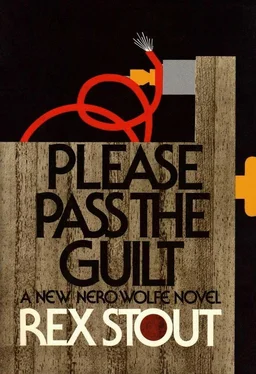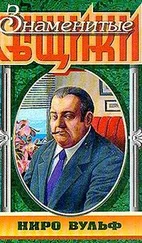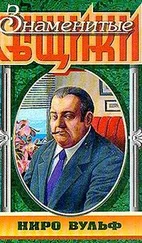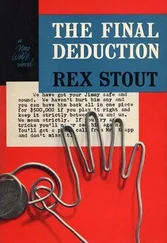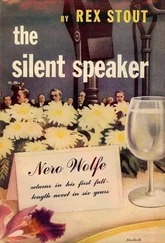“Mrs. Odell didn’t hire you, she hired Nero Wolfe.”
“I work for him.”
“I know you do. And I work for Mr. Browning. When he wants to talk with someone, he doesn’t expect them to be willing to talk with me instead. If Mr. Wolfe wants to talk with me, all right, I suppose I’ll have to. At his office, of course. When does he want me to come?”
There was no point in prolonging it. I said distinctly, “At six o’clock today. An hour and a half from now.”
She said distinctly, “Very well, I’ll be there,” and hung up.
I went to the kitchen, poured myself a glass of milk, and told Fritz, “I’m done. Washed up. I’ve lost my touch. I’m a has-been. You knew me when.”
He was at the big table doing something to a duckling. “Now, Archie,” he said. “He told me about that woman’s diet when I took his breakfast up this morning, but you ate a good lunch. What else has happened?”
“Another woman. She spit at me just now. Spat. On the phone.”
“Then she is washed up, not you. You are looking at the wrong side. Just turn it over, that’s all you ever have to do, just turn it over.”
“I’ll be damned.” I stared at him. “You sound like a guru.”
There was no telling what would happen if Wolfe came down at six o’clock and found an unexpected female sitting in the red leather chair — or rather, there was — so when the glass of milk was down I went up three flights, entered, walked down the aisles between the rainbow benches of the three rooms — cool, medium, and warm — and opened the door of the potting room. He and Theodore were at the long bench, making labels. I stopped halfway across and said, “I’m not breaking a rule. Emergency. We have wasted forty dollars’ worth of orchids.”
He waited until I stopped to turn his head. “She’s not available?”
“Oh, she’s available, but not for menials. When she dies — the sooner, the better — and ascends, she won’t waste her breath on Saint Peter, she’ll speak only to Him, with a capital H. She’ll be here at six o’clock to speak to You, with a capital Y. I apologize and will expect a pay cut.”
“Pfui. I agree that you have not broken a rule.” He made a face. “I’ll be prompt.”
On the way out I stopped to apologize to the two pots of Broughtonia sanguinea. On the way down, I decided that the milk needed help and went to the kitchen for a tall glass of gin and tonic with a sprig of mint and a dash of lime juice. Also for Fritz. I needed friendly companionship.
I was supposing she would be strictly punctual, maybe even a couple of minutes early, but no. She was female. She came at 6:18, in a peach-colored blouse with long sleeves and a brownish skirt, narrow, down to a couple of inches below her knees, and she talked to me. She said, “I’m sorry I’m a little late.” Not being in a mood to meet her halfway, I said, “So am I.”
Wolfe had not told me how he intended to proceed, though he had come down from the plant rooms on the dot at six o’clock, and though he often asks my advice on how to handle a woman and sometimes even follows it. He soon showed me, and her, that this time he needed no help with his game plan. As she got to the red leather chair, he said, “Good afternoon, Miss Lugos. Thank you for coming,” and when she was seated and had her ankles crossed and her skirt tugged, he rose, crossed almost to the door, turned, and said, “I have an errand to do in the kitchen. My agent, Mr. Goodwin, will ask you some questions on behalf of Mrs. Odell.”
He went.
“I’m as surprised as you are,” I told her, “but it’s just like him. No consideration for other people. I think I told you that he thinks I understand women better than he does. He actually believes that. So here we are, in a private detective’s office which could be bugged, instead of the pink room at Rusterman’s. If you like something wet after a day’s work, name it and we may have it.”
Her lips were twitching a little. “I ought to get up and go,” she said. “But I suppose — that would only—”
“Yes,” I agreed, “it would only. Anyway, you’ve flubbed it. On the phone you stiff-armed me. You put me in my place. But if you really meant it, you would have sent the orchids back, or even brought them. Unless you dropped them in the wastebasket?”
She flushed and her lips tightened. I believe I have mentioned that her face was different from any two angles, and it was different flushed. With most faces that you enjoy looking at, you know exactly why, but not with her kind. Flushed, it was again quite different, and I approved of that too. Then suddenly it became another face entirely. She laughed, with her mouth open and her head back, and I think I grinned with pleasure. I really did.
“All right, Mr. Goodwin,” she said, “you win. I didn’t drop them in the wastebasket. They’re in a vase. I almost wish we were at Rusterman’s. But as you said, here we are. So ask your questions.”
I had erased the grin. “Would you like a drink?”
“No, thank you.”
“Then let’s see. First, I guess, that evening you heard what those people said, six of them, when Mr. Wolfe asked them where they were that weekend. Were they all telling the truth?”
“I don’t know. How could I?”
“You might. Maybe you have heard Browning say something that shows he wasn’t on a boat from Friday afternoon to Sunday afternoon, or maybe Kenneth Meer has said something that shows he wasn’t hiking in Vermont. From your look I think you think I’m a damn fool to suppose you would tell me things like that. But I’m not. In an investigation like this only a damn fool would expect a full and honest answer to any question he asks anybody, but he asks them. For instance, the question I ask you now. This: Did Dennis Copes know that Kenneth Meer looked in that drawer every day to check on the whisky supply?”
“That’s a trick question. It assumes that Kenneth Meer did look in the drawer every day.”
“So it does. All right, did he?”
“No. As far as I know, he didn’t. Mr. Browning checked on the whisky supply himself.”
“Did he buy it himself?”
“He buys it by the case. It’s sent to his home and he brings it, two bottles at a time.”
“Does Kenneth Meer drink bourbon?”
“I don’t think so. He drinks vodka.”
“Do you drink bourbon?”
“Very seldom. I don’t drink much of anything.”
“Did you look in the drawer every day to check on the whisky supply?”
“No. Mr. Browning did the looking himself.”
“I thought secretaries checked everything.”
“Well — that’s what you thought.”
“You know Dennis Copes.”
“Certainly.”
“Two people think he might have planted the bomb to get Meer because he wants Meer’s job. If so, he might have thought Meer looked in the drawer every day. Have you any idea why he might think that?”
“No. I have no idea why he thinks anything.”
“One person thinks that Kenneth Meer planted the bomb to get Browning because you go to bed with him. Have you any idea about that?”
“Yes, I have. It’s absurd.”
“A newspaperman I know doesn’t think it’s absurd. Of course it’s really three ideas. One, that you are intimate with Browning, two, that Meer knows it and can’t stand it, and three, that he planted the bomb. Are they all absurd?”
She wasn’t visibly reacting. No flush on her skin, no flash in her eyes. She said, with no change in pitch, “The police have asked me about this. My relations with Mr. Browning are my business and his. Certainly not yours. Women do go to bed with men, so it may not be absurd for people to think I am intimate with Amory Browning, but the idea that Kenneth Meer tried to kill him, that’s absurd. Kenneth Meer has big ideas about his future. He thinks he’s headed for the top, and he’s counting on Amory Browning to help him along.”
Читать дальше
